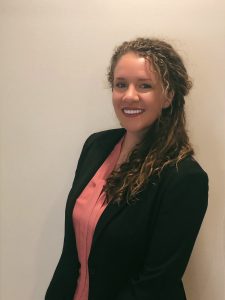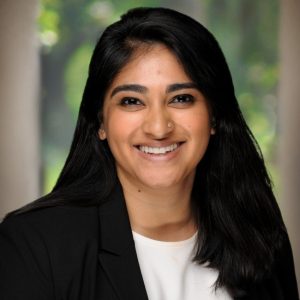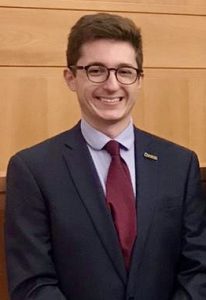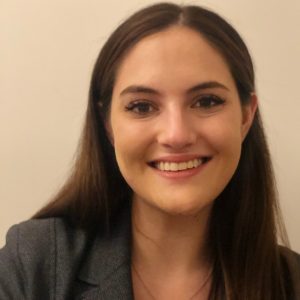Fordham Law’s office of professionalism has launched a new one-year fellowship program for six upper-year students with an interest in and commitment to promoting professionalism, mentorship, and inclusion within the Law School.
The six fellows will play a key role in the Law School’s house system, which aims to enhance the student experience by creating smaller communities of support within the Law School. The house system provides students with a curated co-curriculum consisting of lessons, resources, and information students need as they navigate their first year. The fellows will work closely with the associate dean for academic affairs, the director of professionalism, and faculty house leaders to develop and execute programs designed to help students hone the social, emotional, and professional competencies they will need to flourish academically and throughout their careers.
Five of the fellows will be assigned to one of Fordham Law’s five houses, and will be responsible for organizing social and community-building initiatives within that house and helping the house leader and liaisons implement substantive house programs. The sixth fellow will serve as the inter-house fellow, and will be responsible for overseeing inter-house initiatives and facilitating those collaborations.
“We are thrilled to be launching the professional fellows program and to have such an exceptional set of inaugural fellows,” said Director of Professionalism Jordana Alter Confino. “While we were extremely pleased with the success of the house system rollout this year, it’s become clear that a robust series of social and community-building initiatives is what’s needed to bring the house system to the next level. The professionalism fellows will enable us to achieve this, and will also bring fresh ideas, insights, and perspectives that will allow us to expand and enhance our wellness and professionalism offerings. We look forward to partnering with them on these important projects.”
Associate Dean for Academic Affairs Linda Sugin added, “Incorporating student leadership into the House System is the logical next step in a program designed to empower students to succeed as professionals. The house system was off to a great start in 2019-20, and I am excited to see how the student experience will benefit next year from the enthusiasm, imagination, and compassion of the Professional Fellows.”
The 2020-21 Professionalism Fellows
Cassandra Basile ’21
Hometown: Schenectady, New York
Education: M.A. in Museology/Museum Studies, Columbia University ’16; B.A. in Classics and Classical Languages, Binghamton University ’15
Basile is active within Fordham Law, serving as one of the 2020-2021 media and communications editors for the Brendan Moore Trial Advocacy Center and a BSA advisor for House 9, in addition to being an Environmental Law Review citation editor and a research fellow in the Urban Law Center.
Basile’s interest in this program initially began when she helped out at a few Admitted J.D. Student Days and the LSAT Fair last fall as a student ambassador. “I remember answering prospective students’ questions at the fair, and it was really refreshing to meet so many people who were specifically interested in Fordham because of our evening program and because of our capabilities in public interest,” she said. “I think that’s something that we can really emphasize in the Professional Fellows Program too.”
Basile hopes to shine as a leader during the year-long fellowship and to give back to the incoming class of first-year students. “It would be great to be able to impart the things I learned and the advice I got to someone else – even if they don’t know what they need to ask, which was the biggest issue I had as a 1L,” she explained. “There were so many things I didn’t know, but I didn’t know what to ask. I also want 1Ls to feel comfortable and to realize that it’s ok to reach out and say, ‘I’m just generally confused, can we talk?’ because I know that I wasn’t the type of person to do that.”
Hema Lochan ’21
Hometown: Queens, New York
Education: B.A. in Anthropology, Princeton University ’16
Lochan is a current Fordham Law Stein Scholar, a research assistant for Professor Russell Pearce, an Urban Law Center fellow, and a member of the Coalition of Concerned Students organization. She said she wanted to be a professionalism fellow because she struggled during her first year. “I had a rough transition adapting to law school and navigating the space because I am a first generation, low-income woman of color,” Lochan said. “I’m really interested in diversity and inclusion efforts, and I know how important community matters are. I think fostering a healthy and supportive community helps a lot with the transition into law school, and I can’t wait to be part of that to make a difference.”
Lochan’s most excited to incorporate physical wellness activities into the weekly 1L meetings – like running a 5K, doing yoga sessions, or having dance lessons – since she’s an ultramarathon runner and a certified physical trainer.
Cristina Lombardi ’21
Hometown: Woodcliff Lake, New Jersey
Education: M.A. in Political Science, Villanova University ’15; B.A. in Political Science and Economics, Villanova University ’14
Lombardi serves as the vice president for the Student Bar Association and Symposium Editor for the Urban Law Journal. She is also a research assistant in the Federal Tax Clinic and a student representative for the law school’s COVID-19 Task Force. After graduation, she’d like to work in corporate law, particularly advising on corporate governance issues, because she enjoys learning about companies’ business structures and management strategies. “You have the chance to engage directly with the Board or the leadership of a company, develop relationships with the individuals making the big decisions, understand their goals and concerns, and help them reach a good, thoughtful outcome,” Lombardi explained. “I think my background in political science and comparative politics is conducive to practicing in this area of law.”
Lombardi believes that many students go into their 1L year focused exclusively on grades – because they believe it will solely determine their entire career. Her goal, while being a part of this fellowship program, is to emphasize that while grades are important, it is also necessary for students to have opportunities to assume leadership and responsibility, to develop their skills as an advocate, and to work in a team setting. Lombardi believes that such opportunities will make students better lawyers, while also enabling them to make valuable connections with potential mentors. “I hope that students are given a glimpse into how important it is to have mentors and guidance throughout the law school process. Law school, particularly for someone like me who is a first generation professional, can be an extremely confusing landscape,” Lombardi added. “The support and guidance I received from my mentors were instrumental in getting me through the first two years of law school.”
Brian Sarfo ’22
Hometown: Bronx, New York
Education: M.S. in Education at the Graduate School of Education at the University of Pennsylvania ’19; B.A. in Urban Studies, Columbia University ’17
Currently, Sarfo is the community service chair for the Black Law Students Association and Northeast Director of Advocacy and External Initiatives for the National Black Law Students Association. He believes there is value in having some structured fun on a law school campus where a lot of students tend to be really overwhelmed, stressed, and busy. “If there are designated events with house members, like Trivia Night or going to a sports event, students can be more aware of and participate in these moments that I think, collectively, a lot of students didn’t realize were necessarily there,” Sarfo suggested.
Given the current shelter-in-place circumstances resulting from the coronavirus pandemic, Sarfo is excited to work on implementing remote activities with the other fellows. “We’re currently living in a unique situation where physical interaction isn’t guaranteed, and we have to think outside of the box to really ensure that this program can carry out its purpose, without compromising the health and safety of students,” he said. “It’s also really unique to be able to deal with these challenges now, so that once things go back to ‘normal,’ there’s still a back-up plan in place to coordinate events. I think that’s going to be a part of this program’s fabric moving forward and it’ll be a great benefit to all parties.”
Taryn Saum ’21
Hometown: Myrtle Beach, South Carolina
Education: B.A. in History with a Secondary in African American Studies, Harvard University ’14
Saum is a member of the Urban Law Journal and will serve as a notes and articles editor for the upcoming year. She wants to make meaningful connections with the 1L students and be a go-to resource for them, personally knowing that the first year can be such a daunting time. “It’s possible to overcome obstacles and stress during the 1L year and still have a really good experience moving forward,” Saum said. “I’ve had such a positive experience at Fordham Law and have felt so uplifted by students and faculty that I wanted to share that positive experience with others, and help enable them to have a similarly great educational experience. I’m truly excited to share my enthusiasm for this institution at orientation and other events that are planned throughout the year.”
Kimya Zahedi ’22
Hometown: Bergen County, New Jersey
Education: M.A. in International Relations and International Economics, Johns Hopkins School of Advanced International Studies ’16; B.A. in International Development Studies and Philosophy, Sarah Lawrence College ’13
Zahedi is the chapter director of the International Refugee Assistance Project at Fordham Law. She entered law school at a later age than the average law student, knowing that she wanted to practice international law and human rights law. Since attending Fordham Law, Zahedi has focused on public interest law with an emphasis on human rights.
During her 1L year, Zahedi felt a real responsibility to try to actively combat the toxic culture that’s often associated with the law school environment by organizing trust and community building events within the house system. “I reached out to students who were voicing their opinions inside and outside of class and made them feel encouraged for making themselves vulnerable and enhancing the quality of conversations,” she explained. “I did my best to make everyone feel like our house wasn’t particularly competitive and that we were collaborative, fun, and easygoing instead.”
The post Fordham Law Names Inaugural Class of Professionalism Fellows appeared first on Fordham Law.





























